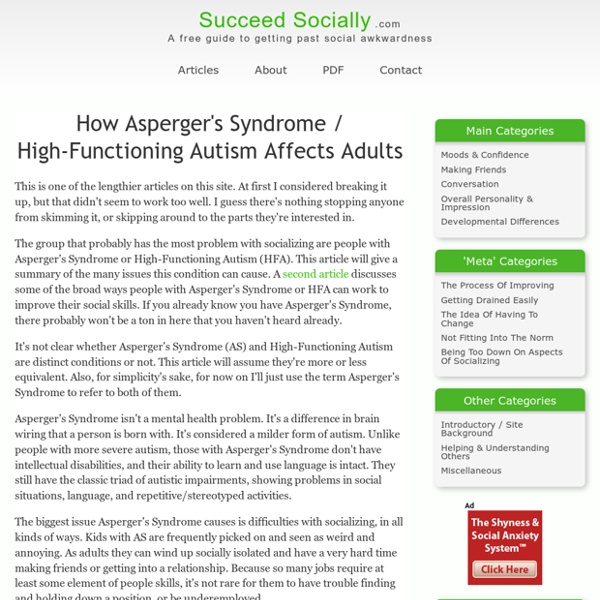The 3 Major Hurdles of the Autistic Spectrum — Asperger Experts
Three major things that are responsible for decreasing the life chances of someone with Autism or Aspergers: Fear, Awareness and Motivation. Fear: So we know that the main biological purpose of fear is to basically keep us alive. If we see a large bear charging us, we get really fearful, and the body goes into fight or flight. Now imagine not having the filter that determines what to be fearful of. But society has a huge role as well, just look at the news media “And here is what you should fear tonight!” Moving on… Awareness: You ask someone with Autism and Aspergers to name everything they did that bugged someone that day, and they will be unable to. And finally.. Motivation: This one is probably the most influenced by the outside world. For example, “Why do I need to brush my teeth?”. So in summary: Fear, Get them away from the news, and instill hope and positivity whenever possible.
Do you prefer bright spaces, dim light, darkness? : Asperger's Syndrome Forum - Page 2
Kiseki wrote:I like darkness. Walking around at 3 AM is extremely calming to me. I also leave all the lights off in my bedroom whenever I'm home. Holy, someone who gets up earlier than I. Unfortunately that didn't last as long as I wanted to...as I find I now just work out in the mornings.
Autism: A Neurological and Sensory Based Perspective
Linda Shriber, OTR/L lshriber@buffalo.edu Autism is defined as a Pervasive Developmental Disorder (PDD) that typically occurs in the first three years of life. More specifically, the Diagnostic and Statistical Manual (DSM-IV, American Psychiatric Association, 1994) defines it as "the presence of markedly abnormal or impaired development in social interaction and communication and a markedly restricted repertoire of activity and interests". Some of the most common symptoms include sensory processing difficulties (Baranek 2002; Dawson and Watling 2000), limited social interaction (Gevers et al. 2006), deficits or delays in language development (Smith et al. 2004), and unusual or problematic behaviors (Horner et al. 2002). Causes of Autism Genetics No one gene has been linked to autism (Vastag 2004), but it has long been theorized that it might be an x-linked disorder because of a high ratio of males (Skuse 2000). Neurotoxins Neurological The Brainstem The Thalamus and Hypothalamus The Cerebrum
Families of Adults Affected By Asperger's Syndrome
Sensory Integration | Autism Research Institute
Video Presentation: Sensory System - Dr. Steve Edelson summarizes emerging research and promising interventions for visual & audtiory support for those on the autism spectrum. By Cindy Hatch-Rasmussen, M.A., OTR/L Children and adults with autism, as well as those with other developmental disabilities, may have a dysfunctional sensory system. Sensory integration is an innate neurobiological process and refers to the integration and interpretation of sensory stimulation from the environment by the brain. Sensory integration focuses primarily on three basic senses--tactile, vestibular, and proprioceptive. Tactile System: The tactile system includes nerves under the skin's surface that send information to the brain. Tactile defensiveness is a condition in which an individual is extremely sensitive to light touch. Vestibular System: The vestibular system refers to structures within the inner ear (the semi-circular canals) that detect movement and changes in the position of the head.
OAR | Educators & Service Providers » 6 Steps to Success for Asperger Syndrome
Having a child with Asperger Syndrome in your class will have a different impact on your classroom environment than having a child with autism. But as is the case with all individuals on the autism spectrum, each individual with Asperger Syndrome is different and will present his or her own unique challenges. Children with Asperger Syndrome often display considerable academic strengths. The first challenge is to recognize that Asperger Syndrome presents serious challenges for both the student and you. Asperger Syndrome is a neurological disorder; individuals with the disorder often have difficulty controlling certain behaviors. To learn more about Asperger Syndrome, please refer to theEducator’s Guide to Asperger Syndromeand other Asperger Syndrome resources listed on this Web site. Following the six-step plan, which is detailed below, will help prepare you to support a child with Asperger Syndrome in your classroom and foster an inclusive learning environment. Step 1: Educate Yourself
Asperger's Syndrome: Secret to Success
Scientist and autism activist Temple Grandin, PhD, reflects on life with Asperger's syndrome. continued... Is there anything that was better in the 1950s than today when it comes to helping children with autism spectrum disorder? Yes. Do you think that the prevalence of Asperger's is increasing today? No. How are adults with Asperger's faring today? I am finding that people with mild Asperger's are all employed today. What else can parents of children with Asperger's do to help their children? Take the Asperger's kid who doesn't have friends and find his or her area of strength and really build on it. What type of thinker or learner are you? I am a visual thinker.



